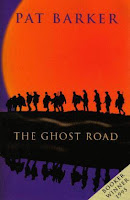 It's evening now, and everybody's scribbling away, telling people the news, or as much of the news as we're allowed to tell them. I look up and down the dormitory and there's hardly a sound except for pages being turned, and here and there a pen scratching. It's like this every evening. And not just letters either. Diaries. Poems. At least two would-be poets in this hut alone.
It's evening now, and everybody's scribbling away, telling people the news, or as much of the news as we're allowed to tell them. I look up and down the dormitory and there's hardly a sound except for pages being turned, and here and there a pen scratching. It's like this every evening. And not just letters either. Diaries. Poems. At least two would-be poets in this hut alone.Why? you have to ask yourself. I think it's a way of claiming immunity. First-person narrators can't die, so as long as we keep telling the story of our own lives we're safe. Ha bloody fucking Ha.
This final book in the Regeneration Trilogy is the most powerful. It is no wonder it was a Booker winner. An intense story about humans and war-all told in a most unusual way. Barker writes in a very clear, easily understandable style, yet she conveys intense feelings and thoughtful observations. Most of the characters are based on historical figures which she has brought to life in a convincing manner.
We may think we know the horrors of war, but after reading Barker it becomes personal on a very human scale. Her book is less about the war than about the myriad of effects, all negative, it has on everyone involved, both directly and indirectly. There many levels of experience in these books- soldiers, girlfriends, wives, patients, nurses, doctors, lovers, friends, etc. The bondscreated and enhanced by the war and displayed in their intensity.





